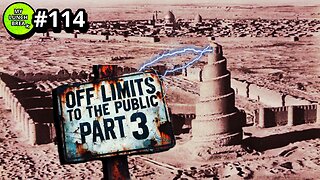Premium Only Content

Episode 2044: What is up with "Dignitas Infinita?" Another useless Vatican Document
On April 8th there was a press conference by Cardinal Victor Manuel Fernandez explaining the Dignitas Infinita, which translates to "infinite dignity," is a recently released document by the Vatican's Dicastery for the Doctrine of the Faith [Vatican document on Human Dignity]. It emphasizes the inherent and inviolable dignity of all human beings, regardless of circumstance.
Before I get into this and further I want to play you a clip from the Press Conference.
What was highly interesting was before the Cardinal explained the document he warned everyone by using cannon law that states not to question of the Holy Father. What he doesn’t say “is unless it goes against the Hermeneutics of Continuity” very crafty and one of the reasons Catholics simply do not trust anything that comes out of the Vatican. They simply are not to be trusted without deep dives in what they say with the doctrines of the faith. So sad this Cardinal is in charge of the doctrine of the Faith. Scary, scary,
Here are some key points about the document:
Core teaching: Dignitas Infinita reaffirms the Catholic belief that every human person is created in the image and likeness of God, thus possessing inherent dignity that transcends social status, physical ability, or any other condition.
Areas of concern: The document identifies various threats to human dignity, including abortion, euthanasia, human trafficking, war, poverty, and certain practices related to procreation such as surrogacy. It also addresses what it terms as "gender ideology" and sex changes.
Response to challenges: The document doesn't just identify issues but offers a message of hope, underscoring the Church's belief in the power of Christ's message to defend human dignity.
Dignitas Infinita has been met with mixed reactions. Some praise its focus on protecting the vulnerable, while others criticize its positions on gender identity and certain reproductive rights.
Here is the detail what it says about the Core Teachings?
Dignitas Infinita dives into the core teaching of human dignity through the lens of Christian anthropology. Here's a breakdown of its key points on this concept:
Intrinsic and Inalienable: The document emphasizes that human dignity is not something bestowed upon us by others or earned through achievements. It's intrinsic to every person from the moment of conception until natural death. Dignity can't be taken away or lessened based on circumstances.
Basis in God's Image: Dignitas Infinita grounds human dignity in the belief that we are created "in the image and likeness of God" (Genesis 1:27). This inherent God-given quality gives every person immeasurable worth.
Equality in Dignity: The document underscores that all human beings possess this equal dignity, regardless of factors like race, gender, ethnicity, age, ability, or sexual orientation.
Dignitas Infinita goes on to explain the implications of this core teaching. It argues that recognizing this inherent dignity compels us to:
Respect the Rights of All: We have a moral obligation to respect the fundamental rights of every person, including the right to life, from conception to natural death.
Promote Social Justice: Understanding human dignity as equal for all calls us to work towards a just society that protects the vulnerable and promotes the well-being of all.
Live with Moral Responsibility: Recognizing the dignity within ourselves and others motivates us to live with moral responsibility and compassion.
Can you provide the detail what it says about Areas of concern.
Dignitas Infinita identifies a range of issues considered threats to human dignity. Here's a closer look at some of these areas of concern:
Life Issues: The document strongly condemns abortion, euthanasia, and assisted suicide. It views these practices as directly violating the right to life, which it considers inherent to human dignity.
Human Exploitation: Dignitas Infinita criticizes practices that exploit or objectify human beings. This includes human trafficking, slavery, prostitution, and unfair working conditions that treat people as mere tools for profit.
Bioethical Concerns: The document raises concerns about certain assisted reproductive technologies. It views practices like surrogacy as potentially undermining human procreation and disrespecting the dignity of both the child and the woman involved.
Gender and Sexuality: Dignitas Infinita addresses what it terms "gender theory," which it sees as challenging the biological differences between men and women. The document also disapproves of sex changes, arguing that they go against a person's God-given sexual identity.
It's important to understand that these are just some of the areas Dignitas Infinita explores. The document delves deeper into the reasoning behind the Church's positions on these issues. It's important to note that these positions are based on Catholic theological and philosophical beliefs, and may be debated by those with different viewpoints.
Dignitas Infinita acknowledges the gravity of the challenges it identifies but doesn't simply offer condemnation. Here's a closer look at the document's message of hope in response to these challenges:
Reaffirming the Power of Christ's Message: The document emphasizes that the core message of Christianity offers guidance and strength in defending human dignity. It highlights the importance of love, compassion, and solidarity in overcoming these challenges.
Promoting a Culture of Life: Dignitas Infinita calls for fostering a "culture of life" that respects and protects human dignity from conception to natural death. This involves promoting education, social support systems, and healthcare access to safeguard the vulnerable.
The Role of the Church: The document sees the Church as having a crucial role in defending human dignity. It calls for the Church to be a voice for the voiceless, advocating for just laws and policies that protect the vulnerable.
Importance of Dialogue: While outlining the Church's teachings, Dignitas Infinita emphasizes the importance of open dialogue with those who hold different views. It encourages respectful conversation to find common ground in protecting human dignity.
Dignitas Infinita doesn't provide specific action plans for each challenge. Instead, it offers a framework based on Catholic beliefs to guide individual and communal responses. It emphasizes the importance of working within society and collaborating with others who share the goal of protecting human dignity, even if they may have different viewpoints on achieving it.
Now lets put on our Traditional Catholic Glasses when viewing this document.
Pope Pius X, known for his staunch opposition to Modernism, likely would have had mixed reactions to the documents of Vatican II. Here's a breakdown:
Areas of Alignment:
Liturgical Reform: Pius X himself instituted some liturgical reforms, emphasizing active participation of the faithful.
Areas of Potential Disagreement:
Modernity: Pius X condemned attempts to reconcile faith with modern thought through his encyclical Pascendi Dominici Gregis. Vatican II, in documents like Gaudium et Spes, acknowledges the importance of engaging with the modern world, which would have raised great concerns for Pius X.
Ecumenism: Vatican II's emphasis on dialogue with other religions (Nostra Aetate) could be seen as a departure from his focus on strengthening Catholicism internally. "In Our Time" in Latin, is a significant declaration issued by the Second Vatican Council of the Catholic Church in 1965.
Overall Viewpoint:
Pius X would have been wary of elements that seemed to embrace modern ideas or downplay traditional Catholic distinctiveness.
Additional Points:
The Catholic Church emphasizes continuity in its teachings. Vatican II mentality aims to present them in a way relevant to the modern world (Hermeneutics of Continuity). Pius X's encyclicals Pascendi Dominici Gregis and Lamentabili Sane
The concept of Hermeneutics of Continuity
The Hermeneutics of Continuity argues that the Church's teachings develop over time, but this development doesn't contradict what came before. It's more like an ongoing story with new chapters that add depth and nuance, but without fundamentally changing the core message.
This approach stands in contrast to the Hermeneutics of Rupture, which views certain pronouncements, particularly those of the Second Vatican Council (1962-65), as a radical break from the past.
Why is it important?
The Hermeneutics of Continuity is important because it provides a framework for understanding how the Church's teachings can evolve while still maintaining a sense of coherence and faithfulness to tradition. This is especially relevant in times of change, when new questions and challenges arise.
-
 1:03:41
1:03:41
Man in America
19 hours agoAre Trump & Musk the COUNTER-ELITES? w/ Derrick Broze
93.8K79 -
 3:45:08
3:45:08
DLDAfterDark
9 hours ago $11.85 earnedDLD Live! SHTF Handguns! Which Would You Choose?
50.8K4 -
 1:50:38
1:50:38
Mally_Mouse
12 hours agoSaturday Shenanigans!! - Let's Play: Mario Party Jamboree
60.1K -
 1:13:00
1:13:00
Patriots With Grit
16 hours agoWill Americans Rise Up? | Jeff Calhoun
49.9K13 -
 14:55
14:55
Exploring With Nug
16 hours ago $11.85 earnedWe Found Semi Truck Containers While Searching for Missing Man!
65K9 -
 27:57
27:57
MYLUNCHBREAK CHANNEL PAGE
1 day agoOff Limits to the Public - Pt 3
151K69 -
 38:07
38:07
Michael Franzese
17 hours agoLeaving Organized Crime and Uncovering Mob in Politics: Tudor Dixon and Michael Franzese
116K15 -
 2:42:54
2:42:54
Jewels Jones Live ®
2 days agoAMERICA IS BACK | A Political Rendezvous - Ep. 111
90.7K50 -
 8:47:33
8:47:33
Due Dissidence
1 day agoLIVE: Workers Strike Back Conference ft. Chris Hedges, Jill Stein, Kshama Sawant, and More!
126K92 -
 8:36:37
8:36:37
Right Side Broadcasting Network
5 days agoLIVE REPLAY: CPAC 2025 Day Three with President Donald J. Trump - 2/22/25
476K104